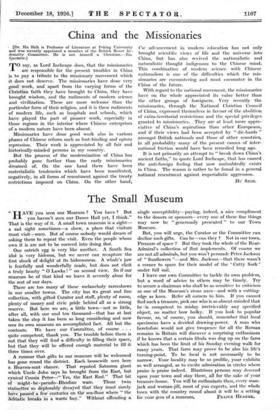China and the Missionaries
[Dr. Hu Shih is Professor of Literature at Poking University and was recently appointed a member of the British Boxer In - demnity .Committee. He is not himself a Christian.—En. Spectator.]
TO say, as Lord Inchcape does, that the missionaries are responsible for the present troubles in China is to pay a tribute to the missionary movement which it does not deserve. The missionaries have done very good work, and apart from the varying forms of the Christian faith they have brought to China, they have brought wisdom, and the rudiments of modern science and civilization. These are more welcome than the particular form of their religion, and it is these rudiments of modern life, such as hospitals and schools, which have played the part of pioneer work, especially in thoie regions in the interior where Chinese enterprises of a modern nature have been absent.
Missionaries have done good work also in various phases of Chinese reform such as foot-binding and opium repression. Their work is appreciated by all fair and historically-minded persons in my country.
But the process of the modernization of China has probably gone further than the early missionaries dreamed of. On the one hand there have been materialistic tendencies which have been manifested, negatively, in all forms of resentment against the treaty restrictions imposed on China. On the other hand, the advancement in modern education has not only brought scientific views of life and the universe into China, but has also revived the nationalistic and naturalistic thought indigenous to the Chinese mind. This combination of modern science with Chinese nationalism is one of the difficulties which the mis- sionaries are encountering and must encounter in the China of the future.
With regard to the national movement, the missionaries have. on the whole appreciated its value better than the other groups of foreigners. Very recently the missionaries, through the National Christian Council of China, expressed themselves in favour of the abolition of extra-territorial restrictions and the special privileges granted to missionaries. They are at least more appre- ciative of China's aspirations than other Europeans, and if their views had been accepted by " die-hards " amongst British nationals and those of other countries, in all probability many of the present causes of inter- national friction would have been remedied long ago.
It is not primarily an attempt to " break down China's ancient faiths," to quote Lord Inchcape, that has caused the anti-foreign feeling that now undoubtedly exists in China. The reason is rather to be found in a general national resentment against imperialistic aggression.
Hu Snur.










































 Previous page
Previous page